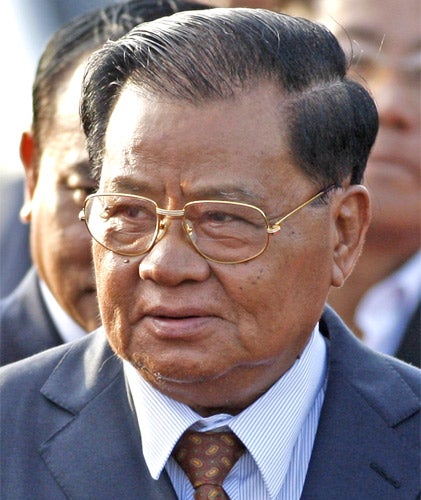India welcomes Burmese general with open arms

Your support helps us to tell the story
From reproductive rights to climate change to Big Tech, The Independent is on the ground when the story is developing. Whether it's investigating the financials of Elon Musk's pro-Trump PAC or producing our latest documentary, 'The A Word', which shines a light on the American women fighting for reproductive rights, we know how important it is to parse out the facts from the messaging.
At such a critical moment in US history, we need reporters on the ground. Your donation allows us to keep sending journalists to speak to both sides of the story.
The Independent is trusted by Americans across the entire political spectrum. And unlike many other quality news outlets, we choose not to lock Americans out of our reporting and analysis with paywalls. We believe quality journalism should be available to everyone, paid for by those who can afford it.
Your support makes all the difference.India welcomed the head of Burma's isolated military government yesterday, despite international criticism and extended aid to the regime for railroad and agriculture projects, as New Delhi competes to assert its influence in the region.
India's relationship with Burma, considered a pariah in some quarters for its suppression of democracy and human rights, has taken on new importance because of concerns over insurgencies and drug trafficking along their shared border.
India has also grown wary of China's influence in Burma and is in competition with its regional rival for access to the country's large natural gas resources.
Burma junta chief Than Shwe held talks with India's Prime Minister Manmohan Singh, with officials of the two countries later signing agreements to combat the smuggling of arms, drugs and ammunition across their 1,025-mile frontier and cooperate in the fields of information, science and technology. "There are insurgencies on both sides [of the border] and both countries need each other," said G. Parthasarathy, a former Indian ambassador to Myanmar. The two sides agreed on close cooperation between their security forces in tackling terrorism and that neither side's territory would be used for training, sanctuary and other operations by terrorist and insurgent organisations, a joint statement issued after the talks said. They would strengthen cooperation at their border in fighting insurgency, it said. India agreed to consider Burma's request for assistance in three areas – information technology development, industrial development and infrastructure development in Burma.
India will give £6.4m to Burma to procure agricultural machinery from New Delhi, the statement said. India's state-owned EXIM Bank also loaned £39m to Burma for financing of railway projects, said Soe Tha, Burma's minister of national planning and economic development.
The EXIM Bank has so far loaned a total of £161m for railways, telecommunications, a refinery, a truck assembly plant and electricity transmission lines.
India also agreed to help restore the renowned Ananda Temple, a noted Buddhist shrine and major tourist attraction, in Burma's central Bagan district, said a statement by India's External Affairs Ministry.
After many years of supporting the democratic movement in Burma led by Nobel Peace Prize laureate Aung San Suu Kyi, India has switched tracks and reached out to the military regime. It has established deep economic and military ties with Burma's generals over the past decade, overlooking the reclusive junta's poor record on political and human rights.
New Delhi has said it believes talking quietly is a better approach than sanctions.
Join our commenting forum
Join thought-provoking conversations, follow other Independent readers and see their replies
Comments